Aloha Animal Medical Center
Veterinary
Services
At Aloha Animal Medical Center, your pets are in great hands. Our mission is to serve clients with extensive knowledge about the services we provide.

Veterinary Services
Aloha Animal Medical Center Services
Give your beloved companion the medical attention he or she deserves with services from Aloha Animal Medical Center. From wellness exams and pet vaccinations to advanced diagnostics and complex surgical procedures, your dog, cat, or ferret will receive high-quality medical care at our hospital in Aloha, Oregon.
Our mission is to serve clients with the extensive knowledge and expertise we have gained over the years, while continually offering the finest in customer service and the latest possible cutting-edge medicine available. Trust our dedicated team for:

Allergy Testing
An allergic reaction is one in which an individual reacts to a normal substance in the environment. These substances are called allergens and include pollens, molds, animal hair, dust, fleas, foods, and more. Allergens cause reactions through skin contact, inhalation, or ingestion. Allergic animals possess antibodies to specific allergens. These antibodies cause biochemical changes in the body which produce allergy symptoms such as skin irritations with intense itching, respiratory distress, feet licking, chewing, face rubbing, vomiting, diarrhea, or repeat ear infections to name a few. Identifying the problem at its source will treat today’s issues and prevent tomorrow’s.

Bathing
Treat your pet to a luxurious bath. Our special, cleansing baths remove dirt, debris, and that doggie (or kitty) pet odor – your pet will feel fresh and revitalized. If scratching is a problem, our medicated baths contain soothing agents that stop the itching. Services also include nail trim, ear cleaning, and anal gland expression. We also offer dematting services.

Behavioral Medicine
Pets can have a wide variety of behavioral issues, from simple housetraining problems to severe anxiety and aggression issues. We are well qualified and experienced in diagnosing and addressing behavior problems with an approach that combines skills from veterinary clinical medicine, behavioral medicine, and pet training. Our goals are to help pets and their owners live together comfortably and safely and to help restore the bond between pets and their families.
Before you and your pet suffer through one more day of inappropriate behavior, call us. Let’s talk about how we can help.

Dental Care
Does your best friend have bad breath? Despite what many pet owners may believe, “dog breath” is not just a nuisance – it’s a sign of an unhealthy mouth. Bad breath is caused by bacteria. Over time, bacteria lead to plaque and tartar buildup on your pet’s teeth. The result is bad breath, reddened gums, and other common signs of dental disease. As dental disease progresses, other signs can include drooling, discomfort while chewing, and loose or missing teeth. Even if you’re using treats and chews to help control tartar, these are frequently not enough to keep dental disease in check. Ask us about the best ways to control plaque and help protect your pet from dental disease.
Dental hygiene is an important part of your pet’s health because dental disease can be associated with other serious health problems such as heart disease and kidney disease. But how do you know if your pet has a healthy mouth? Let us examine your pet’s teeth and gums to help determine if there are any dental issues you should know about. After a brief visual examination, we may recommend a more detailed examination (which requires sedation), a dental cleaning, or options for at-home dental care.
Even if you think your pet’s teeth and gums are fine, we can offer expert advice to help you keep them that way! Dental health shouldn’t be taken for granted. Fortunately, many dental problems can be managed through at-home care and by bringing your pet to us for regular dental checkups and teeth cleanings.
We want your pet to live a long, healthy life, and we understand that maintaining a healthy mouth is part of that. Your pet’s health is important to us, so let us help you with this commitment. Call today to discuss your pet’s dental care needs and how we can help!
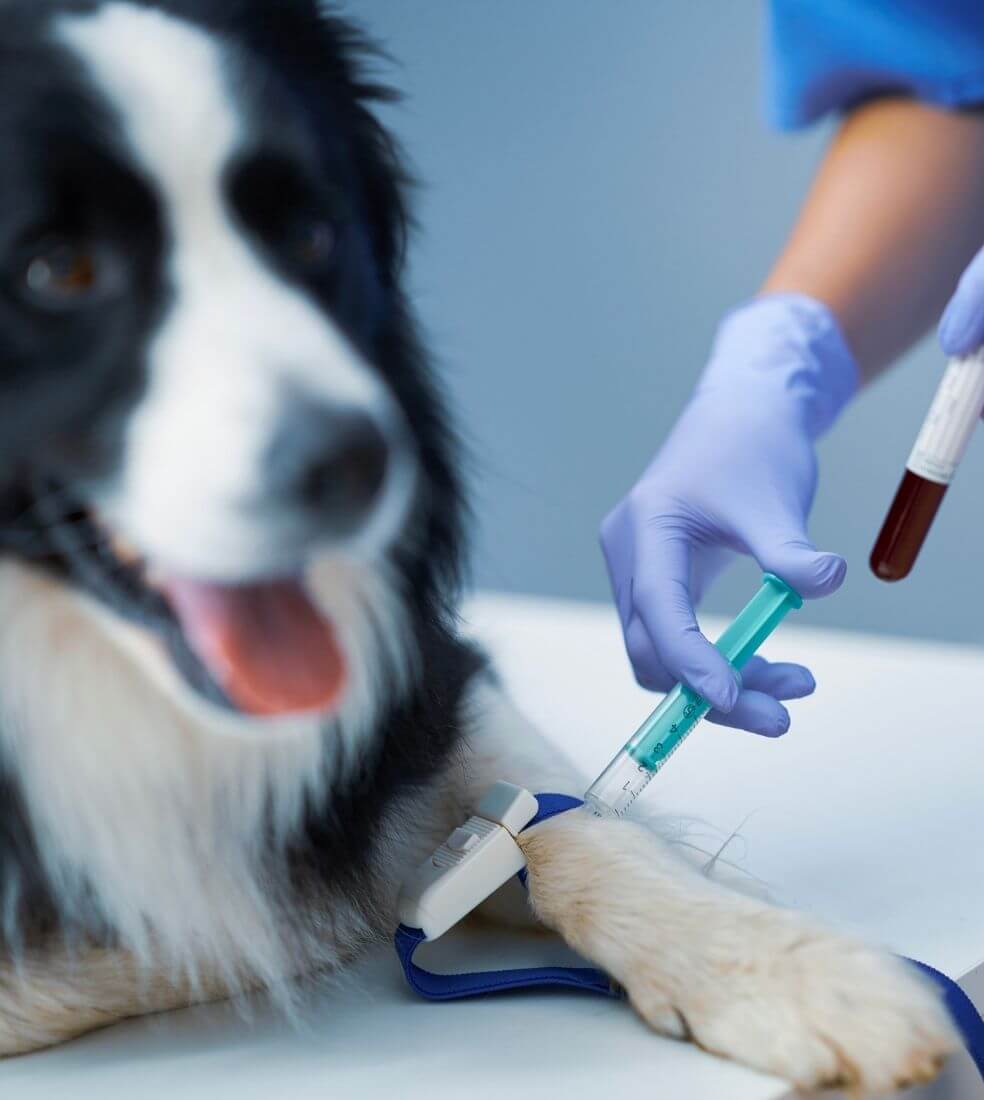
Diagnostic Testing
Diagnostics like blood and urine tests help to determine if all body systems are functioning as they should, as well as screening for health issues to which your pet’s breed may be genetically predisposed. Bloodwork also tests for conditions like early kidney or liver disease. Early detection and treatment can often be the difference between a relatively easy and affordable treatment and a more expensive, and perhaps riskier, intervention later on.
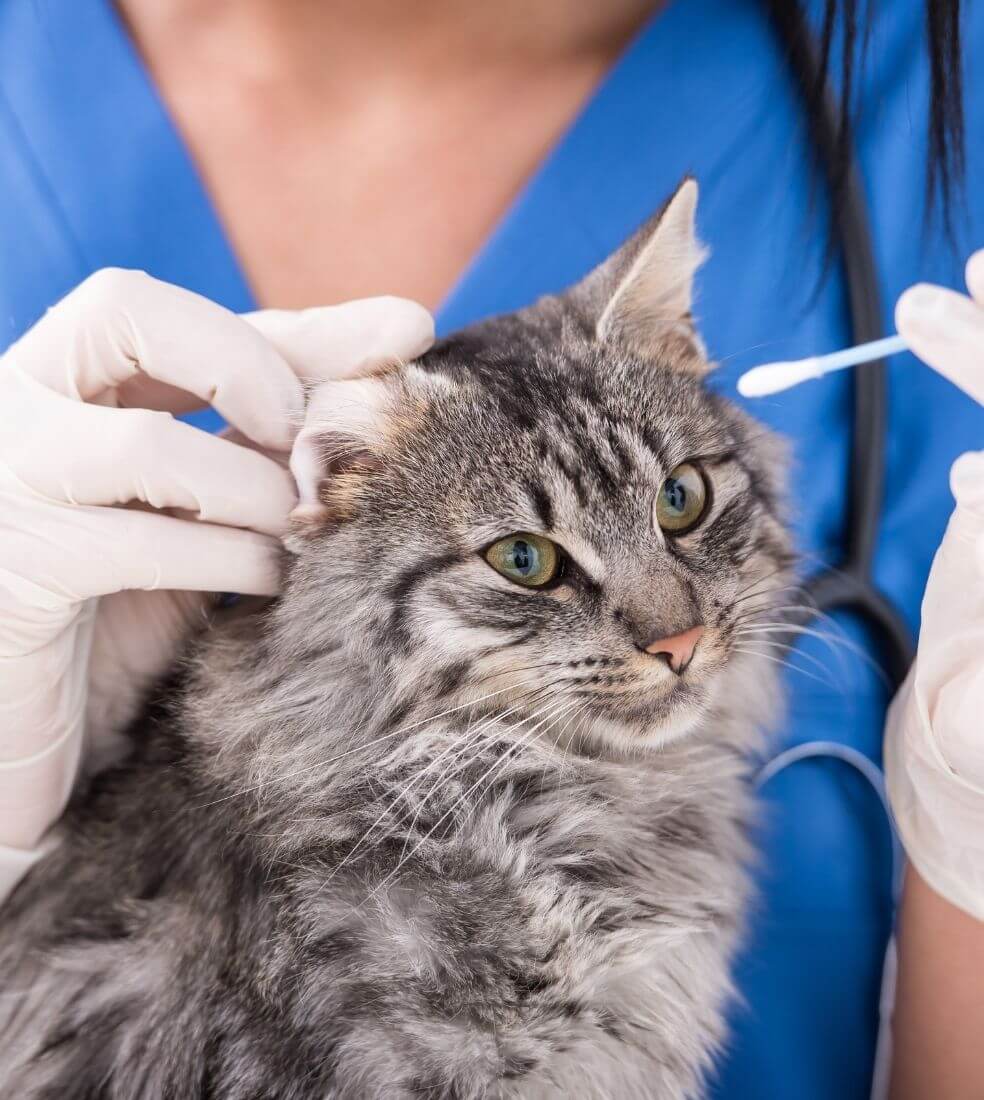
Ear Care
Ear infections in dogs are common and most dogs suffer from this painful condition sometime in their life. Scratching and rubbing at the ear(s) and head shaking are common signs. You may also notice an abnormal odor from the ear or see redness or swelling. Most ear infections in adults are caused by bacteria and yeast, though ear mites are a common cause in puppies.
Causes and Prevention of Ear Infection in Dogs
Prevention depends on identifying the underlying cause of the ear infection. In some cases, the ear canal becomes moist from bathing, grooming, or swimming. This moisture fosters the growth of microorganisms in the ear canal. Prevention in these cases can be as simple as cleaning the ear as previously described to remove the moisture and prevent the infection. However, in many cases, an underlying cause may not be so easily identified. Dogs that suffer from allergies, either environmental, such as pollens (grasses, trees, and weeds), dust mites, molds, or food (beef, chicken, fish, soy, etc.) are predisposed to ear infections. This is due to the microscopic inflammation that allergies cause in the skin allowing overgrowth of bacterial and yeast organisms that normally inhabit the skin.

Exam/Life Stages Consultation
Physical examinations are crucial to your pet’s health because, unlike humans, your pet cannot tell you where it hurts. A complete physical examination by your veterinarian includes eyes, ears, heart, lungs, joints, skin, mouth, nutrition and weight assessment, and life-stage counseling. During your pet’s physical exam, the doctor will answer questions you have regarding your pets health, behavior, and care recommendations. After the exam, the office staff will be able to provide you with estimates for future procedures or treatments recommended by the doctor.

Hospice & Euthanasia
Are you having problems caring for a terminally ill pet at home? Does your pet have a medical condition that is painful or causing poor quality of life? Are you afraid that your sick or elderly pet is suffering?
Our staff of compassionate, caring professionals can help you through this painful experience. We offer hospice services and will work with you to ensure your pet’s comfort and dignity during his or her last days and final moments. Do you have special requests? Do you have questions about the care of your pet’s remains? We can help you with these concerns and will make every effort to accommodate your wishes at this very difficult time.
Deciding when your pet may need hospice care or euthanasia is a very personal and private decision, but that doesn’t mean you have to make this difficult choice on your own. Our hospice and humane euthanasia services are conducted with respect, compassion, and care. Before you struggle through one more day with a sick, elderly, or terminally ill pet that is suffering, call us to learn how we can help.

Laser Therapy
Heal your pet with drug-free, surgery-free, pain-free relief. This FDA-approved deep-penetrating light allows relief of pain through the release of endorphins and stimulates the injured cells to heal at a faster rate. Some of the disorders that respond to laser therapy include: arthritis, hip dysplasia, numerous skin conditions, post-surgical pain relief, and increased healing, ear infections, bites/stings, lacerations/abrasions, cystitis, burns, and more.

Microchip Implanting
Each year, thousands of pets go missing, and many don’t make it back home. Many pets (especially indoor pets) don’t wear collars or tags. Even if your pet wears a collar and identification tag, collars can break off and tags can become damaged and unreadable, so these forms of identification may not be enough to ensure your pet’s safe return. Your pet needs a form of identification that is reliable and can’t get lost, stolen, or damaged. A microchip is a safe, simple form of identification that can significantly increase the chance that your pet will return safely.
A microchip is about the size and shape of a grain of rice and is placed underneath your pet’s skin between the shoulder blades. Microchip implantation takes only a few minutes and is very safe. Each microchip is unique and carries vital information about your pet—including your name, address, and contact information. When a microchip is implanted, the pet owner is given a registration form to complete. Registering the number on the microchip includes your pet in a national pet recovery database. Veterinary hospitals, animal shelters, and animal control offices across the country are equipped with special electronic scanners that can detect the microchip and read the identification number. If a lost pet is picked up by animal control or found by a good Samaritan and presented to a veterinarian, a quick scan of the microchip reveals the identification number. A toll-free phone call to the pet recovery database alerts the microchip company that a lost pet has been identified. The pet owner can then be contacted and reunited with his or her pet!
Young puppies and kittens can receive microchips, but even if your pet is already an adult, you should consider microchipping. Even indoor pets can get outside accidentally and get lost, so if you’re relying on other forms of identification, you could be placing your pet at risk. Microchipping is a safe, effective way to help ensure your pet’s return if the unthinkable happens.

Nutritional Counseling
From the very first day, you bring a new pet home through the final days of its life, nutrition plays a critical role in your pet’s overall health and well-being. Many pet owners take nutrition for granted, in part because the availability of so many nutritionally complete commercial diets has taken much of the guesswork out of choosing a suitable diet for a pet. However, did you know that your pet’s nutritional needs change with age and activity level? Did you know that specially formulated diets can assist in the management of various medical conditions, including kidney disease, diabetes, arthritis, and heart disease? Do you know how many calories your pet should have each day and whether you are over-or underfeeding? Are you comfortable reading and interpreting pet food labels?
Whether your pet has special dietary needs or simply needs to shed (or gain) a few pounds, our nutritional counseling services can help you accomplish your goals and keep your pet in good health. We offer counseling in dietary selection and feeding practices for pets during various life stages, such as growth, pregnancy, nursing, and the “golden years.” If your pet has a medical condition, we can help you select the most appropriate diet to suit your pet’s needs.
It can be easy for a pet owner to become overwhelmed by the available selection of pet foods, all of which claim to have specific benefits for pets. We can offer expert advice to help you negotiate the complicated array of choices. Let our nutritional counseling service help you achieve and maintain optimal nutrition for your pet.
Giant Breeds
Giant breeds such as Great Danes, Irish wolfhounds, and giant schnauzers have unique dietary requirements. Very few commercial puppy foods offer the ideal mix of calcium, energy, and protein levels that these breeds need. We can provide you with feeding recommendations that will encourage your dog’s maximum growth potential without causing developmental problems. For added convenience, we also stock veterinary-approved diets for giant breeds.
Please don’t hesitate to contact us if you have any concerns regarding your dog’s nutrition or if you would simply like to discuss this topic with us.
Puppies/Kittens
It’s easy to get confused or overwhelmed by all the pet foods on the market. We can help you weed through the choices and find a puppy or kitten food that will meet your growing pet’s specific nutritional needs. We even carry many nutritionally balanced, veterinary-approved brands in our clinic.
Feel free to ask us for a food recommendation or to contact us with any nutrition questions or concerns you might have. We’re happy to help!
Pet Food, Supplements, and Treats
The right food can make a big difference in your pet’s health. That’s why we offer a wide variety of specialty and therapeutic diets for all life stages and disease conditions. We also carry special supplements for general wellness and for acute and chronic disease conditions.
Are you trying to help your pet lose weight, but you’d still like to give him or her a treat occasionally? Ask about our special lower-calorie treats, which you can give your pet without any guilt.
If your pet is at risk for dental disease, we have diets, chews, and treats that can help keep his or her gums and teeth healthier by controlling plaque and tartar.
We’d be happy to recommend a diet for your pet. Veterinary consultation is required for our prescription diet foods and our supplements. Call us today to schedule an appointment to discuss your pet’s nutritional needs.

Pain Management
The practice of high-quality veterinary medicine focuses on the entire patient – from medical issues that affect physical functioning, to emotional and psychological issues that affect well-being. Experiencing pain can affect the body’s physical functioning and can have a detrimental effect on a patient’s well-being and state of mind. That’s why pain management is among our primary considerations when we are treating a pet for any medical condition.
From routine procedures (such as spays or dental cleanings) to more advanced medical treatments (such as bone surgeries or cancer treatments), to chronically painful conditions (such as arthritis or back pain), we are dedicated to providing safe and effective pain management to every patient. We will also help you recognize signs of pain in your pet so that we can modify his or her pain management plan when necessary.
Recognizing and alleviating pain in our patients is at the very heart of quality, compassionate patient care. We don’t take pain management for granted and will employ all our skills to help ensure your pet’s comfort, well-being, and full recovery.
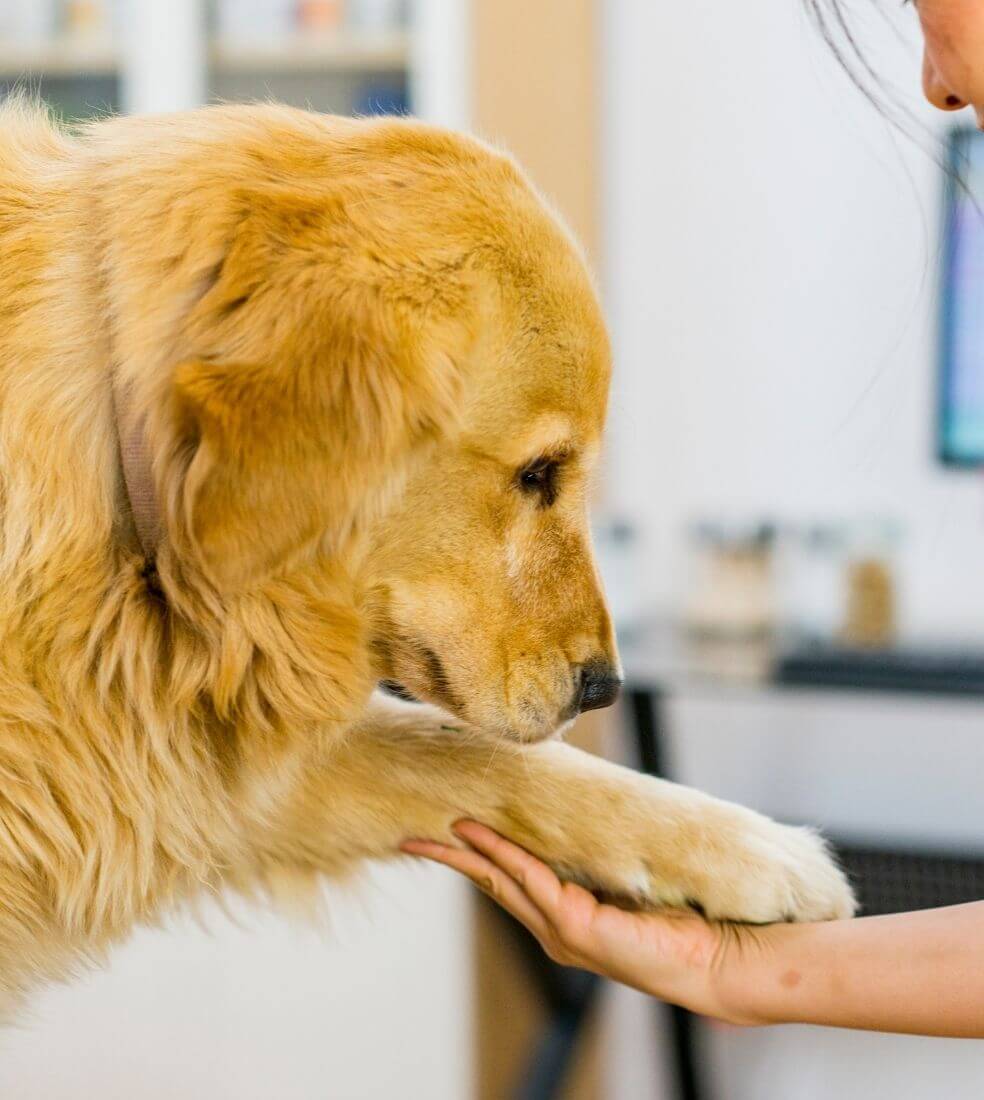
Parasite Prevention & Control
There was a time when parasites like fleas, ticks, and roundworms were considered mostly a nuisance. Now, however, we know that parasites can cause serious illness and even death in pets. For example, ticks can transmit infections like Lyme disease, and fleas can transmit tapeworms and Bartonella – the bacteria that causes “cat-scratch fever” in humans. Another type of parasite, called a heartworm, is transmitted by mosquitoes. Heartworms live in your pet’s lungs and heart, causing damage to these organs, and sometimes even death. Intestinal parasites, like roundworms and hookworms, also threaten pets and are even transmissible to humans.
You may not always be able to tell if your pet has parasites. Fleas can hide under your pet’s fur, and some ticks are very tiny (only the size of a pinhead), so they are very difficult to find. Intestinal parasites like roundworms can cause diarrhea and other problems, but many infected pets don’t show any signs of illness at all.
Fortunately, we can recommend tests to tell if your pet has parasites. We can also examine your pet for evidence of fleas, ticks, or other parasites. Our expert staff can recommend medications to help control fleas, ticks, heartworms, and intestinal parasites. Preventing parasites in your pets also helps protect children and other family members, so let’s work together to protect your pets and family.
Veterinary examinations and parasite testing are important ways to protect your pet’s health. Let our knowledgeable staff provide you with a comprehensive parasite control program. We can recommend a schedule for parasite testing, discuss what signs of parasites you can look for at home, review ways to control parasites in and around your home, discuss treatment options if your pet has parasites, and recommend ways to control and prevent parasites in the future.
Parasites are not just a nuisance. They can carry serious diseases that affect your pet’s overall health and longevity. Let us help you protect your pet.
Flea Prevention & Control
Fleas can cause problems for pets ranging from minor to life-threatening. Not only can these parasites cause severe itching, irritation, and allergies, but they can also transmit tapeworms and diseases. Fleas can infest dogs, cats, ferrets, mice, and rats. And fleas don’t just stay on pets; they can bite people, too. For more information, contact us or see the flea article in the Pet Health Library on our site.
You don’t want these blood-sucking parasites on your pet or in your home. We can help keep them away or help you get rid of them if they’ve already found their way inside. Call us to find out how to eliminate and control fleas or to start your pet on a preventive today.
Heartworm Prevention
When they bite, mosquitoes can transmit heartworm infection. And those heartworms can wreak havoc on your dog or cat. These parasites can severely and sometimes fatally damage the heart, lungs, and blood vessels. Some pets may not show any signs of infection; in those that do, symptoms can vary widely.
In dogs, signs of heartworm disease can range from coughing, fatigue, and weight loss to difficulty breathing and a swollen abdomen (caused by fluid accumulation from heart failure). Canine heartworm infection can also lead to a life-threatening complication called “caval syndrome” (a form of liver failure); without prompt surgical intervention, this condition usually causes death.
Although often thought to not be susceptible to heartworm infection, cats can indeed get heartworms. Cats can suffer from a syndrome referred to as heartworm-associated respiratory disease (HARD); the symptoms can be subtle and may mimic those of asthma or allergic bronchitis. Signs of respiratory distress, such as rapid or difficult breathing, wheezing, and panting, are common. Other symptoms include coughing, vomiting (typically unrelated to eating), and loss of appetite or weight. Heartworm infection is more difficult to diagnose in cats than it is in dogs.
Treatment for heartworm infection is far more expensive than prevention—and it can actually kill your dog. There is no approved treatment for cats. Some cats spontaneously rid themselves of the infection; others might not survive it. And even one or two adult heartworms in a cat can cause serious problems.
Fortunately, there’s an easy way to keep your dog or cat safe: by administering monthly heartworm preventives. Most heartworm medications also protect your pet against other parasites, such as roundworms, hookworms, whipworms, ear mites, fleas, and ticks. We can recommend the best regimen of prevention for your pet.
Tick Prevention
Ticks are becoming more and more prevalent in North America, and they’re now being found in areas where people and pets didn’t previously encounter ticks. These parasites aren’t just a nuisance; they can cause serious—and sometimes deadly—diseases, including Lyme disease, Rocky Mountain spotted fever, babesiosis, ehrlichiosis, and tick paralysis. Contact us immediately if your pet starts coughing or has joint pain, trouble breathing, fever, weakness, or loss of appetite, weight, energy, or coordination.
The best method for keeping ticks off your pet is by keeping your dog or cat on a tick preventive. Even indoor-only pets are at risk because ticks can hitch a ride inside on your clothing or shoes. Tick preventives are safe and highly effective at controlling ticks and the diseases they carry. Call us to get your pet protected today!
Don’t panic if you find a tick on your dog or cat, even if your pet is on a preventive. Some preventives kill ticks after they’ve come in contact with your pet. Ticks can hide easily under your pet’s fur, so as an added measure of protection, we recommend checking your pet for ticks every time your pet comes in from outside. And don’t hesitate to ask us any questions you might have.

Puppy & Kitten Care
Do you have a new puppy or kitten? Congratulations on this addition to your family! One of the first things you should do when you bring your new pet home is to introduce him or her to us – your veterinary care team. Puppy and kitten visits offer a unique opportunity to get you and your new pet off on the right foot!
Your puppy or kitten visit will include a full “nose-to-tail” physical examination. We will look for any signs of illness and make sure that your new pet is in good health.
Do you have questions about nutrition, training, vaccinations, grooming, parasite protection, or overall health? What about tips for introducing your new pet to other pets and family members? Even if you are a very experienced pet owner and have had puppies or kittens before, each pet is unique and offers an opportunity to learn something new! We welcome your questions and look forward to addressing any concerns you may have. The more educated you are about your pet, the better you will be able to care for him or her, so we strive to offer you all the support you need.
Puppy and kitten wellness visits also present an opportunity to discuss your new pet’s recommended vaccine schedule and the best plan for parasite testing, treatment, and prevention. Our doctors and other staff members are well-educated about veterinary vaccines and parasite control, and our goal is to give you the best advice for your puppy or kitten. We will review your pet’s vaccine and deworming schedule and discuss the best way to continue, so don’t forget to bring any records that you have received.
We will work hard to help you understand your pet’s health considerations, and we encourage you to be involved in decisions regarding your puppy’s or kitten’s health care. Puppy and kitten visits are an excellent way to get your new pet started on the road to a happy and healthy life. Let’s take these important first steps together.
Please call today to schedule an appointment for us to meet your new pet!

Radiology (X-Rays)
Radiography is a valuable diagnostic tool in veterinary medicine. As we continually strive to offer the highest quality medicine and diagnostic testing, we are pleased to offer DIGITAL radiology services as a means of providing excellent care to our patients.
A radiograph (sometimes called an x-ray) is a type of photograph that can look inside the body and reveal information that may not be discernible from the outside. Radiography can be used to evaluate almost any organ in the body, including the heart, lungs, and abdominal organs, as well as the bones.
Radiography is painless, safe, and completely non-invasive, and it uses only very low doses of radiation. Because the level of radiation exposure needed to perform radiography is very low, even pregnant females and very young pets can undergo radiography. Radiographs can be used to evaluate bones as well as the size, shape, and position of many of the body’s organs. The size of organs is important because some medical conditions—such as kidney, heart, or liver disease—can alter the size of these organs. The shape and position of organs can be altered or distorted by certain medical conditions, including intestinal blockage or cancer. Tumors, depending on their size and location, can also sometimes be detected using radiography. Radiography can also be used to diagnose bladder stones, broken bones, chronic arthritis, certain spinal cord diseases, and a variety of other conditions.
Radiographs are an important tool that can help us make a correct diagnosis for your pet. Our radiology service is staffed by caring, skilled professionals who will provide state-of-the-art care with compassion and expertise.
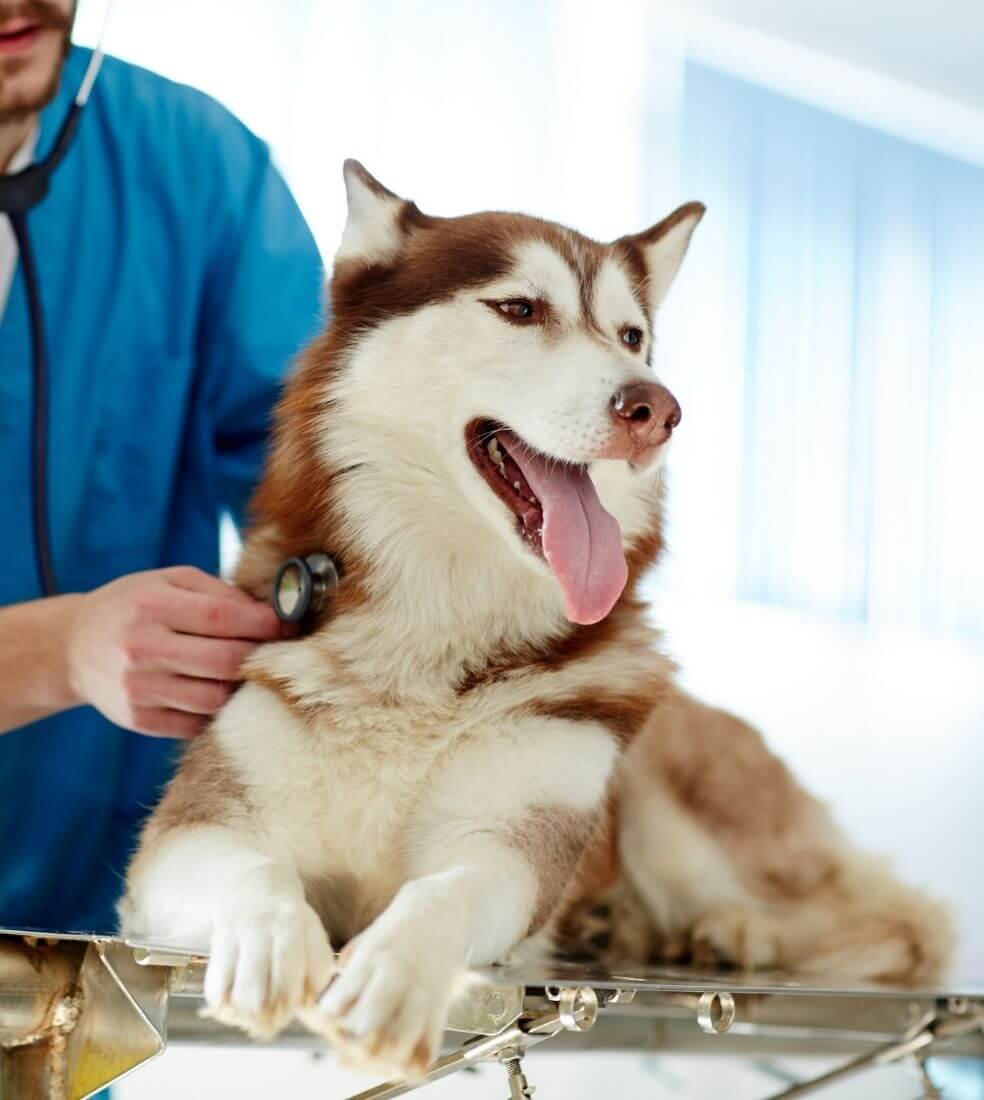
Senior Care
Did you know that pets age faster than people and can be considered “seniors” at around 7 years of age? Just as our health care needs change as we age, your pet’s health care needs also change. Nutritional needs, exercise habits, and many aspects of your pet’s daily routine can change as your pet ages. But how can you tell the difference between “normal” aging and a medical problem? As in humans, some health issues that affect older pets can begin with very subtle changes that may go unnoticed until the problem has become serious.
Regular wellness visits are important for every stage of your pet’s life, so don’t forget to keep your senior pet’s scheduled wellness appointments. The best way to help protect your pet as he or she ages is to understand the aging process in pets. We understand that process and can help you help your pet. Even if your senior pet is already being treated for a medical condition, treatment recommendations can change as a condition progresses. Sometimes medication dosages need to be adjusted, or medication may need to be changed. Routine wellness blood work and other routine diagnostic testing are important for senior pets because these tests allow us to evaluate how your pet’s health is either responding to current management strategies or changing with age.
Your senior pet’s wellness examination is also your chance to have us address any of your questions or concerns about your pet. We welcome your questions and encourage you to be involved in decisions regarding your pet’s health care.
Older pets make wonderful companions, and thanks to advances in veterinary medicine, pets are living longer than ever! You are an important ally in your senior pet’s health care. We are here to help ensure that your pet is safe and happy throughout the “golden years”.
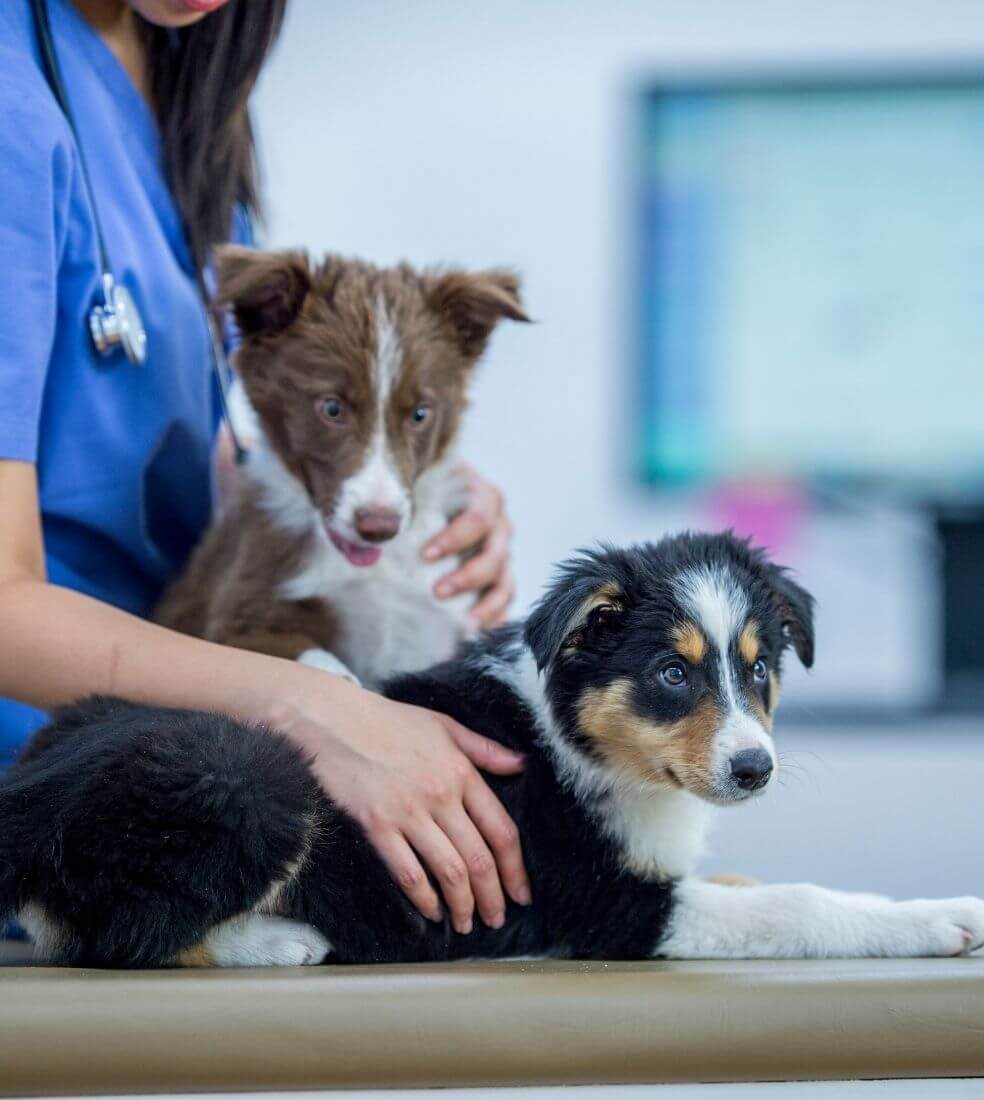
Spay/Neuter Service
The decision to spay or neuter your pet is an important one for pet owners. But it can be the single best decision you make for his long-term welfare.
- Unaltered pets have an increased urge to roam, exposing them to fights with other animals, getting struck by cars, and other mishaps.
- Unspayed female cats and dogs have a far greater chance of developing pyrometra (a fatal uterine infection), uterine cancer, and other cancers of the reproductive system.
- Male pets who are neutered eliminate their chances of getting testicular cancer, and it is thought they have lowered rates of prostate cancer as well.
Altering your pet will also help to curb bad behavior. For cats, the urge to spray is extremely strong in an intact cat. The simplest solution is to get yours neutered or spayed at 6 months of age before there’s even a problem. It can also minimize howling, the urge to roam, and fighting with other males. Unneutered dogs are much more assertive and prone to urine marking. Although it is most often associated with male dogs, females may do it too. Spaying or neutering your dog should reduce urine marking and may stop it altogether.
Getting your pets spayed/neutered will not change their fundamental personality, like their protective instinct.

Surgery
In our continuing efforts to offer the highest quality veterinary medicine, we are pleased to provide a wide range of surgical services for our patients. From routine surgical procedures, such as spaying and neutering, to more complex surgeries, we look forward to the opportunity to care for your pet’s surgical needs.
Our staff is highly skilled in performing veterinary surgeries and will make every effort to ensure that your pet receives the very best care. Our focus on patient safety, pain management, and employing the most current surgical practices is designed to exceed your expectations and put your concerns to rest. Our staff of compassionate, caring professionals will monitor your pet before, during, and after surgery and will take exceptional care to ensure a safe and complete recovery for your pet. We will also address any questions or concerns you may have about surgery, including concerns about anesthesia, pain management, or postoperative care.
When your pet is ready to go home, we will review your postoperative care and medication instructions. If any questions arise after your pet returns home or at any other time during the postoperative period, call us. We welcome your questions and will do all we can to help your pet recover fully. Help is only a phone call away.
Surgery can be a source of anxiety and stress for many pet owners. Maybe you worry about whether your pet will be well cared for, or perhaps you have concerns about adequate precautions and monitoring. Let us address your concerns. Whether your pet needs minor surgery or a complex procedure, call us. Let’s discuss how our surgical services can benefit your pet.
Orthopedic Surgery
We perform many types of orthopedic (bone) surgeries in our clinic. Because we want to ensure that our patients receive the best possible outcome, we occasionally refer them to board-certified orthopedic surgeons to perform back surgery and other very complex surgeries.
Leg fractures are the most common orthopedic problem presented at our clinic and usually result from a mishap with an automobile. They can be treated in a variety of ways depending on the location and type of fracture. We can apply a cast to treat certain fractures; however, many fractures will require surgical intervention:
- “Pinning” stabilizes the fracture by inserting a long stainless steel rod into the middle of the bone across the fractured area.
- “Plating” involves attaching a flat stainless steel plate to the bone using screws on either side of the fracture.
- “External fixation” stabilizes fractures using a series of pins on the outside of the leg that pass through the skin and into the bone on either side of the fracture.
We are stocked with a variety of plates, pins to surgically stabilize most fractures. Please contact us if you have any questions about these procedures or if you think your pet might benefit from them.
Extracapsular Repair
- The knee joint is first inspected via a small incision. The torn remnants of the ACL are removed and the meniscal structures are examined. If the meniscus is torn, the damaged portion is removed.
- A strong, non-absorbable suture (nylon band) is passed around a small bone on the back of the knee and then placed through a small hole made in the front of the tibia bone. The suture is then tightened which serves to prevent drawer motion, effectively taking over the job of the torn cruciate ligament.
- Over time, scar tissue will form around the suture which helps to stabilize the joint.
- This technique is most commonly used in small dogs under 50lbs, senior less active dogs and cats.
- About 85% of patients show a significant improvement after surgery and are able to resume pre-injury activities.
Soft Tissue Surgery
We perform many types of soft tissue surgeries at our clinic. Soft tissue surgeries are those that are not associated with bone. These surgeries can provide many benefits to pets.
Probably the most common soft tissue surgery performed on pets is the removal of masses or lumps. Most of these masses, once removed and tested, are found to be benign (nonharmful); however, occasionally they are more serious. Early removal and accurate diagnosis of a lump are necessary to improve the outcome in your pet if the mass is cancerous.
If your dog suffers from frequent ear infections, surgical intervention can reduce their occurrence by improving airflow into the ear canal.
Surgery can also help resolve several problems related to the eyes. Tearing in your pet’s eyes can mean an infection is present or maybe a sign that the cornea (outer layer of the eye) has been damaged. Surgery may allow the cornea to heal faster with less scarring, improving your pet’s ability to see. In some pets, the eyelashes may actually damage the cornea. Surgical intervention improves comfort in these pets, reduces the chances of corneal scarring, and enhances the pet’s vision in the long term.
Please contact us if you’d like to discuss how soft tissue surgery might be able to help your pet.

Ultrasound
Although humans and animals are different in many ways, some advances in human medicine are also very useful for veterinary patients. One of these advances, diagnostic ultrasound, has proven to be a powerful tool in veterinary medicine. As a practice, one of our goals is to offer state-of-the-art medicine and diagnostic testing; so we are pleased to offer ultrasound services as a means of providing a higher level of quality care to our patients.
Ultrasonography is a type of diagnostic technique that uses ultrasound waves to produce an imaging study. This means that when we perform ultrasonography, we can see internal images of the patient’s body. Unlike some other imaging studies, like x-rays, ultrasonography does not use radiation. Instead, ultrasonography uses high-frequency sound (ultrasound) waves to create a picture of what is inside your pet’s body. Ultrasonography is a completely non-invasive, painless way to diagnose and evaluate many common diseases.
An ultrasound machine generates ultrasound waves. The machine is connected to a small probe that is held gently against your pet’s skin. The probe sends out painless ultrasound waves that bounce off of structures (for example, organs) in your pet’s body and return to a sensor inside the ultrasound machine. The ultrasound equipment collects these reflected “echoes” and uses them to generate images that are viewable on a screen. Ultrasound waves can generate excellent images of abdominal organs, including the liver, spleen, gallbladder, and kidneys. It is also useful for assessing fetal health and monitoring pregnancy in breeding animals, and it can help us diagnose and stage (determine the severity of) some forms of cancer.
Because ultrasound images are produced in real-time, this technology can be used to evaluate the heart as it beats. This can help us detect abnormalities in the motion of heart valves, blood flow through the heart, and contractions of the heart muscle. It can also be used to assess the heart for defects. As we strive to provide our patients with the highest quality medicine and diagnostic testing, we are pleased to offer ultrasound as one of our diagnostic capabilities.
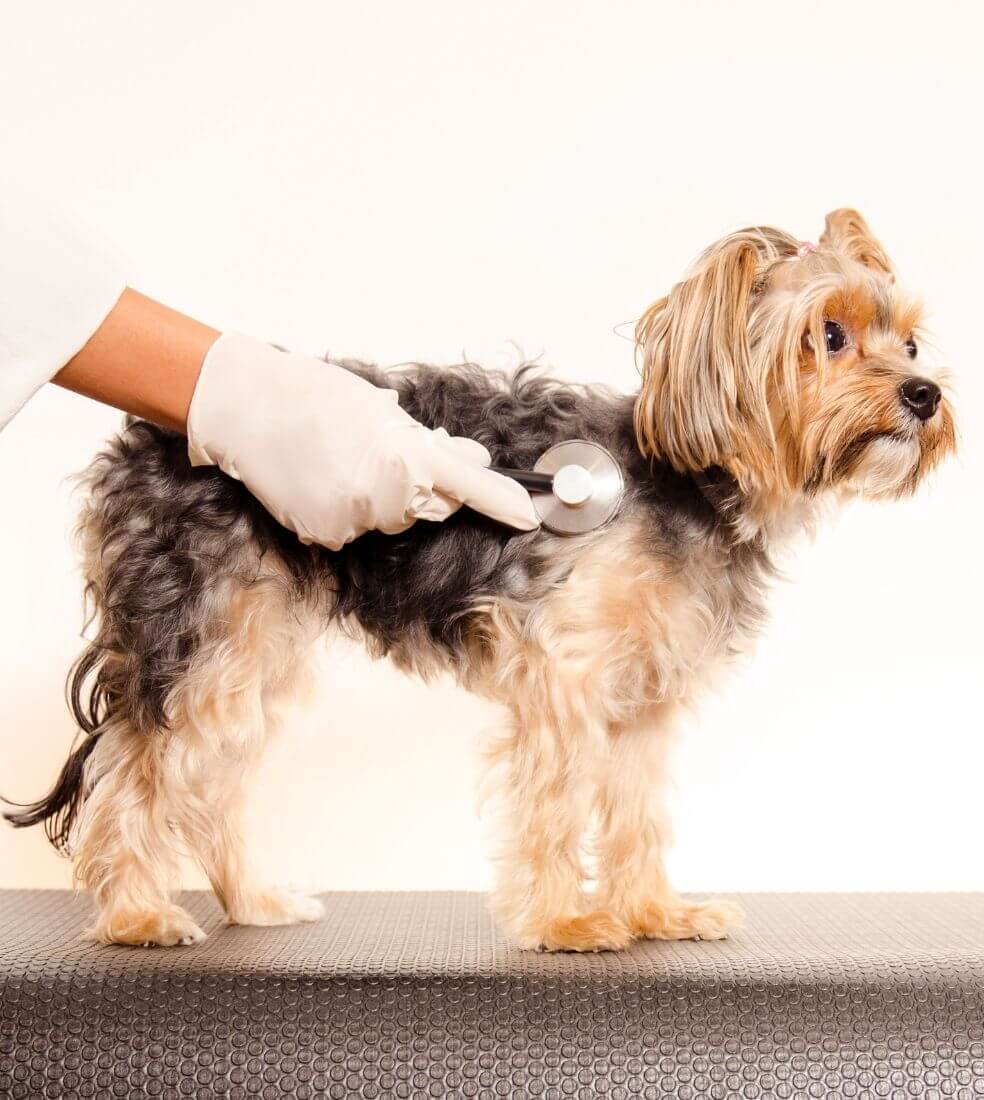
VOM
VOM is a healing chiropractic technology that locates areas of the animal’s nervous system that has fallen out of communication, re-establishes neuronal communication, and thus induces healing. VOM is singularly a very effective and safe healing modality in veterinary care. For the VOM practitioner, it is an exquisitely objective, fast, and easy to apply technology whose scope of application appears yet to be fully appreciated. Routinely treated are conditions such as acute and non-acute lameness, progressive lameness, hip dysplasia-like syndromes, IV disc disease, progressive myelopathies, urinary/fecal incontinence, unilateral lameness, wobbler’s disease, diseases of the knee, esophageal disease, GI mobility disease, digestive disorders, performance problems, behavioral problems, agility dysfunction, endocrine disease, and many more.

Vaccination
Pets today can live longer, healthier lives than ever before—in part because of vaccines that help protect them from deadly infectious diseases. Over the years, vaccines against dangerous diseases have saved millions of pets and virtually eliminated some fatal diseases that were once common. Unfortunately, many infectious diseases still pose a significant threat to dogs and cats that are unvaccinated. Although vaccine programs have been highly successful and vaccines are considered routine today, we (as caregivers) and you (as pet parents) cannot afford to become complacent about keeping pets up-to-date on their vaccinations.
Many vaccines are available for use in dogs and cats, but not every pet needs every available vaccine. Some vaccines are considered core vaccines and should be administered to all pets, whereas other vaccines are optional and may be recommended for pets based on a variety of factors, such as their risk for exposure to disease. Vaccine recommendations can also change throughout a pet’s life, as travel habits and other variables change. We will consider all these factors as we determine which vaccines your pet should have.
We understand that your pet is unique and that no single vaccine program will be ideal for every pet in every situation. Our doctors and other staff members are well-educated about veterinary vaccines, and our goal is to give you the best advice for keeping your pet healthy. Let us develop a vaccination schedule and ongoing booster routine that accounts for your pet’s lifestyle, overall health, the risk for exposure to infectious disease, and other factors.
Vaccines help pets live longer, healthier lives. Protecting your pet is our primary goal, so developing an appropriate vaccine schedule for your pet is important to us. Call us today to set up an appointment to discuss your pet’s vaccination needs.

Wellness Exam
Your pet can benefit greatly from regular wellness examinations or checkups. Whether your pet is a youngster, a “senior citizen,” or any age in between, wellness examinations provide an excellent opportunity for us to conduct a thorough physical examination and develop a health profile for your pet. This information will help us identify medical problems and any other issues that can affect your pet’s health and quality of life.
A wellness examination includes an evaluation of all of your pet’s major organ systems. We’ll use the wellness visit to ask you questions about your pet’s behavior, appetite, exercise habits, and regular activities at home. This is also an excellent time for us to discuss any routine diagnostic testing that may benefit your pet or to recommend any vaccinations that may be due. If your pet seems healthy, a wellness examination is a good opportunity to note any changes, such as weight gain or loss or other subtle changes that may not be evident at home. Sometimes, information obtained during a wellness examination can help detect early signs of illness and address health issues before they progress.
A wellness examination is also your chance to have us address your questions or concerns about your pet. We welcome your questions. No question is too small or too silly, and it is our pleasure to address your concerns. We strive to help you understand your pet’s health considerations, and we encourage you to be involved in decisions regarding your pet’s health care.
Finally, wellness examinations help us establish a relationship with you and your pet. Through your pet’s physical examinations, other wellness procedures, and our consultations with you, we get to know your pet and learn about his or her lifestyle, personality, health risks, home environment, and other important information. We encourage you to use wellness examinations to take an active role in your pet’s health care.
